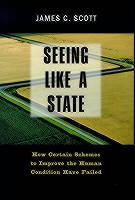Let op! Om diverse redenen kan de voorraad die hier op de website wordt getoond soms niet overeenkomen met de werkelijk aanwezige voorraad in de winkel.
Seeing like a state
€24.95
Compulsory ujamaa villages in Tanzania, collectivization in Russia, Le Corbusier’s urban planning theory realized in Brasilia, the Great Leap Forward in China, agricultural “modernization” in the Tropics — the twentieth century has been racked by grand utopian schemes that have inadvertently brought death and disruption to millions. Why do well-intentioned plans for improving the human condition go tragically awry? In this wide-ranging and original book, James C. Scott analyzes failed cases of large-scale authoritarian plans in a variety of fields. Centrally managed social plans misfire, Scott argues, when they impose schematic visions that do violence to complex interdependencies that are not — and cannot — be fully understood. Further, the success of designs for social organization depends upon the recognition that local, practical knowledge is as important as formal, epistemic knowledge. The author builds a persuasive case against “development theory” and imperialistic state planning that disregards the values, desires, and objections of its subjects. He identifies and discusses four conditions common to all planning disasters: administrative ordering of nature and society by the state; a “high-modernist ideology” that places confidence in the ability of science to improve every aspect of human life; a willingness to use authoritarian state power to effect large-scale interventions; and a prostrate civil society that cannot effectively resist such plans.
Auteur: Scott, James C. Jaar: 1998 ISBN: 9780300078152 Pagina's: 445 Taal: English Uitgever: Yale University Press Uitgever stad: New Haven/London Verschijningsdatum:






